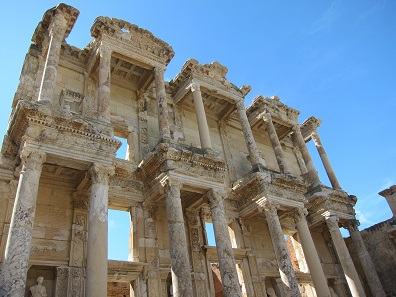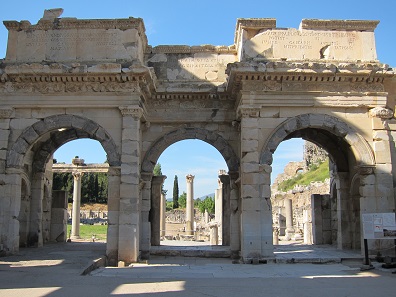By Ursula Kampmann
Translated by Christina Schlögel
September 22, 2016 – 188 archaeologists from 22 nations worked in Ephesus from 4 May until 30 November 2015. They explored a late antique residence south of the Church of Mary and dug in the Serapeum and Curetes Street, making both spectacular and slightly less spectacular discoveries. They also restored the Fountain of Domitian as well as the mural paintings in Terrace House 2. 1,392 excavated coins were classified, 126 restored. For the last 120 years the Austrian Archaeological Institute has been the host organisation of this international research project. For more than a century, this project has not only been one of the most significant digs in the Mediterranean area, but it was also a training programme for hundreds of archaeologists from around the globe.
The Library of Celsus. Unearthed in 1905/6, it was rebuilt from 1970 until 1978, funded by the Austrian ‘construction-tycoon’ Anton Kallinger-Prskawetz and the Austrian Association of the Friends of Ephesus. Foto: KW.
All of this is now history. On 31 August 2016, the Austrian archaeologists had to stop working by order of the Foreign Ministry due to “persistent diplomatic tension with Austria”, as the Turkish news agency Dogan announced on 4 September 2016. From now on, this utterly complex excavation will be conducted by the director of the Ephesos Museum.
The South Gate of the Agora. Its rebuilding was also financed by Anton Kallinger-Prskawetz and the Austrian Association of the Friends of Ephesus. Foto: KW.
Indeed the relationship between Ankara and Vienna has been somewhat frosty. Early in August, the Chancellor of Austria Christian Kern demanded an end to the EU accession talks with Turkey. He criticised the democratic standards in Turkey, deeming them insufficient to justify an EU accession. In addition he stated that Turkey’s economy was far from the European average and that the difference in wage levels was too high. Thus he implied an increase of Turkish immigration to the EU, should the accession take place.
On the initiative of the Austrian Association of the Friends of Ephesus, a roofing of the Terrace Houses was financed with the slogan “A roof for Ephesus”. Foto: KW.
Turkish foreign secretary Mevlut Cavusoglu then described Austria as the “capital of radical racism”. Kern however seemed unimpressed: “We are not supplicants before Turkey”. No one should fear any consequences, should the negotiations be aborted.
It seems as though voters agree with his stance, which is an even bigger nuisance to Turkey. After a pro-Kurdish protest march with only 600 participants, Ankara asked the Turkish ambassador to return from Vienna for further “consultation”. The Viennese airport Schwechat is another point of issue. An advertisement of the Austrian newspaper Kronen Zeitung had poignantly summed up the results of a public poll: Spending your holiday in Turkey unnecessarily supports Erdogan. Shortly before that, Turkish newspapers had been outraged by several photos shared on social media, in which someone had documented a message from the official news-ticker of the airport: “Turkey allows sex with children under the age of 15”.
The victims of this political squabbling will not only be a 120-year long tradition, but also the four archaeologists whose theses revolve around the excavation in Ephesus. Another victim: Ephesus itself. Bumping out the Austrian Archaeological Institute will result in the loss of more than a century’s worth of experience.
Numerous daily media reported on the revocation of the excavating licence, for instance the Süddeutsche Zeitung, Fokus and of course the Austrian Kronen Zeitung. In the English-speaking press it hasn’t become an issue until now. There are only very few reports in the specialized press. Here you will find something in the Science Magazine and in the Art Newspaper.
If you would like to take a trip down Ephesus-memory lane, we would recommend our diaries of numismatic travelling.
In 2013, Italian archeologists already lost their excavating licence in Hierapolis.
The German Archaeological Institute lost their excavating licence in Aizanoi in the same year.
Our article “Byzantine Church in Turkey re-converted to mosque” shows how cultural heritage in Turkey is overshadowed by politics and religion.
How does Turkey manage to preserve its cultural heritage? Please read “Coins and stones – bones of contention” and “Hunger Strike of Turkish Archaeologists Averted”.







